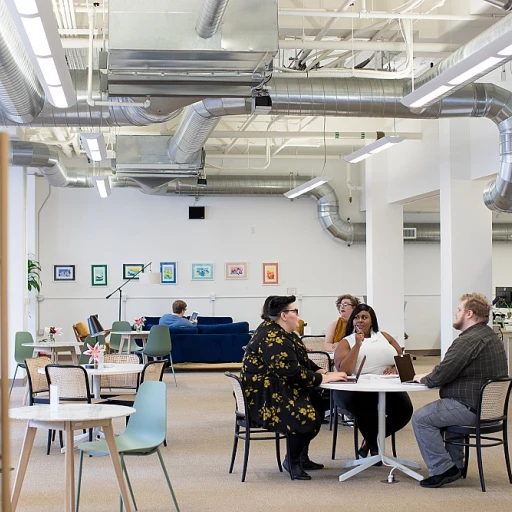
Understanding the Role of an Employee Experience Manager
The Impact of an Employee Experience Manager on Remote Work
The role of an Employee Experience Manager is crucial in shaping a positive workplace culture, especially in a remote work environment. These professionals focus on creating an engaging employee journey that ensures work satisfaction, fosters communication, and improves employee engagement. As companies adapt to the evolving workplace dynamics, maintaining an active employee life cycle becomes essential. Experience managers play a vital role in facilitating smooth onboarding experiences that set the tone for employees' entire work life.
An experience manager in any business acts as a bridge between employees and management, aiming to foster a work environment where employees feel valued. They utilize employee feedback to implement best practices and tailor strategies that align with the company's culture and objectives. This role is not only about managing the present but also about looking ahead—developing an organization where the experience employees have today informs the company’s success in the future.
In remote work settings, an Employee Experience Manager's presence can significantly impact the organization’s ability to retain top talent, drive employee engagement, and cultivate a thriving business culture. They are instrumental in implementing feedback loops and communication enhancements to ensure employees feel connected, despite the distance. The result is a more connected and productive remote workforce capable of achieving business goals efficiently.
Adapting Employee Experience Strategies for Remote Work
Tailoring Employee Experience Strategies for Remote Settings
In the evolving landscape of remote work, adapting employee experience strategies is crucial for ensuring that employees feel valued and engaged. As organizations pivot to more flexible work environments, the role of an employee experience manager becomes pivotal in crafting a positive employee journey.
Effective experience management in remote settings involves rethinking traditional strategies to suit the unique challenges and opportunities that remote work presents. Here are some best practices for adapting employee experience strategies:
- Enhanced Communication: Clear and consistent communication is key to maintaining a strong connection with remote employees. Utilizing digital tools for regular updates and feedback can improve employee engagement and ensure that employees feel heard and supported.
- Virtual Onboarding: A seamless onboarding process is essential for new remote employees. Experience managers should focus on creating a structured onboarding journey that includes virtual meet-and-greets and engaging morning activities for remote teams, helping new hires integrate into the company culture effectively.
- Continuous Feedback Mechanisms: Implementing regular feedback loops allows employees to share their experiences and insights, fostering a culture of open communication. This feedback is invaluable for experience managers to refine strategies and enhance the overall workplace experience.
- Employee Development Opportunities: Providing opportunities for professional growth and development is crucial in remote settings. Organizations should offer virtual training sessions and workshops to ensure that employees continue to grow and advance in their careers.
By focusing on these strategies, companies can create a supportive and engaging remote work environment that not only enhances the employee life cycle but also strengthens the overall business culture. As we delve deeper into the tools and technologies that facilitate remote employee experience management, it's clear that the integration of these strategies is fundamental to long-term success.
Tools and Technologies for Remote Employee Experience Management
Optimizing Technology for Remote Employee Engagement
In the ever-evolving landscape of remote work, effective management of employee experience heavily relies on utilizing the right tools and technologies. These support not only connectivity but also enhance the sense of belonging, engagement, and productivity among remote employees. A dedicated employee experience manager plays a crucial role in orchestrating this technological symphony. With a vast array of software and platforms available today, choosing the right ones for your organization can be daunting. Implementing tools that streamline communication, feedback, and collaboration ultimately foster a positive workplace experience and improve employee engagement. Platforms such as Slack, Zoom, or Microsoft Teams are great for instant communication. These tools ensure that employees feel connected and valued as part of a coherent team, even across distances. Moreover, integrating technologies for onboarding, such as learning management systems, is essential in helping new employees during the initial stages of their employee journey. These systems can provide structured training, deliver educational resources, and facilitate communication, which are significant in making new team members feel engaged and valued. Feedback mechanisms are another integral component of management technologies. Utilizing platforms like SurveyMonkey or employee feedback apps helps gather insights into the employee life cycle, offering data that is pivotal in enhancing employee experience strategies. By analyzing this feedback, experience managers can respond effectively, promoting a culture of continuous improvement and demonstrating that the organization values its employees' opinions. As remote work becomes more prevalent, understanding the dynamics of horizontal and vertical organizations in remote work (you can explore further on this here), becomes vital in deploying the right technological solutions. It's essential for businesses to ensure their technologies align with company culture and business goals, offering a seamless and positive employee experience throughout. In conclusion, the choice and implementation of technologies can significantly influence the remote work environment. Businesses that prioritize robust tech solutions for communication, onboarding, feedback, and management are likely to see enhanced employee engagement and a noticeable improvement in overall company culture. As an experience manager, staying current with these tools is key to driving successful employee experience management in a remote setting.Building a Remote Work Culture with Employee Experience in Mind
Nurturing a Positive Remote Work Environment
Creating a thriving remote work culture requires an intentional focus on employee experience management. Experience managers play a vital role in fostering a supportive and progressive work environment that promotes both personal and professional development. One of the key tasks for managers in remote settings is to maintain clear and consistent communication. Without the benefit of casual face-to-face interactions, it's essential for companies to implement strategies that ensure employees feel connected and engaged. Utilizing available technology to facilitate regular team meetings and provide updates can greatly enhance the workplace experience. Another crucial aspect is onboarding. Ensuring that new employees experience a smooth integration into the company is paramount. A well-structured onboarding process that includes virtual introductions to team members and an overview of company culture helps in setting the foundation for a positive employee journey. Feedback, too, should not be neglected. Gathering and acting on employee feedback can significantly improve employee satisfaction and engagement levels. Business leaders can include regular feedback sessions to better understand employee needs and tailor strategies accordingly. Furthermore, recognizing achievements and contributions by employees helps in fostering a positive culture where employees feel valued. This, combined with opportunities for career development, can motivate employees and enhance their experience. Lastly, it's important for organizations to emphasize the human element in remote work. Experience managers should aim to create an environment where employees are treated as business partners, fostering a sense of belonging and investment in the organization's goals. Building a robust company culture with a focus on employee engagement and experience can lead to a more fulfilling work life cycle, ultimately benefiting both the organization and its people.Measuring Success: Key Metrics for Remote Employee Experience
Monitoring the Impact of Employee Initiatives
In remote work environments, consistently gauging the success of employee experience initiatives is crucial. Experience managers need to prioritize feedback systems that allow employees to express their perspectives on the tools, strategies, and cultural elements within the organization. Constructive employee feedback paves the way for adjustments and improvements in the employee journey, ensuring that team members feel valued and engaged.
Identifying Key Success Metrics
To effectively measure remote employee experience, businesses should focus on specific key performance indicators (KPIs) that reflect workforce engagement and satisfaction accurately. Some valuable metrics include:
- Employee Engagement Scores: Regular surveys provide insights into how engaged employees feel, directly impacting overall productivity.
- Retention Rates: Healthy retention rates are often a reflection of a positive work environment and satisfying employee life cycle experiences.
- Onboarding and Development Metrics: Evaluating the success of onboarding processes helps organizations understand how well new employees integrate and their subsequent development journey.
- Peer Feedback: A structured peer feedback mechanism enables a deeper understanding of employee interactions and camaraderie, influencing workplace culture positively.
Continuous Feedback Loops
Implementing a systematic approach to gather continuous feedback is essential for experience management. Tools such as pulse surveys and virtual feedback sessions, as well as informal communication channels, ensure managers are updated on employee sentiments. This ongoing feedback loop helps managers identify trends, address challenges proactively, and tailor strategies that better align with employee needs and expectations.
Aligning with Business Goals
A successful remote work experience doesn’t exist in a vacuum; it should align with broader organizational objectives. Experience managers need to work closely with human resources and other business partners to ensure that employee engagement strategies drive company goals forward. This collaboration enhances the alignment between positive employee experiences and the achievement of organizational milestones.
Future Trends in Remote Employee Experience Management
Looking Ahead: Evolution of Employee Experience Management
Predicting the future of remote employee experience management necessitates a deep understanding of current trends and potential advancements. As organizations continue to rely on remote work, companies must anticipate how the role of an employee experience manager will evolve. Here, we delve into key trends that are likely to shape the landscape of remote work and the enhancement of employee experience.- Technology Integration: The integration of advanced tools and technologies is set to revolutionize the way managers handle employee experience. With AI and analytics gaining ground, experience managers will have a wealth of data at their fingertips to improve employee feedback mechanisms and engagement strategies. Such technology will aid in personalizing the employee journey, thus making employees feel valued and enhancing workplace experience.
- Focus on Well-being: The broader work culture is likely to prioritize employee well-being more intensely. Experience managers will need to incorporate well-being initiatives that foster a positive and inclusive work environment. This shift requires a holistic approach to employee life cycle management, emphasizing mental health and work-life balance as crucial components of employee engagement.
- Dynamic Onboarding Processes: As remote work environments become increasingly prevalent, the demand for dynamic and engaging onboarding processes will grow. This will include tailored experiences that adapt to employee needs, potentially leading to revised best practices that prioritize a smooth transition into the organization.
- Enhanced Communication Practices: With remote work environments in mind, communication practices are bound to evolve. Companies will invest in more robust communication tools and platforms, ensuring that effective channels are in place for open dialogue. This approach will enhance the role of human resources as a business partner in cultivating strong employee relationships.
- Continuous Development and Learning Opportunities: Professional development is set to be a cornerstone of remote employee experience. Business leaders will emphasize continuous development through certifications, workshops, and resources that maintain an engaged workforce and foster career growth. This focus aligns with the organization’s long-term strategies for cultivating a skilled and committed team.













